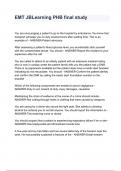Class notes
Law of Succession and Trusts - Lecture 9 - Variation and Termination
- Course
- Institution
Class notes from ninth lecture of the module Law of Succession and Trusts. Lecture covers variation and termination of trusts in Scots law. Important notes are highlighted, and case descriptions are given. Author achieved first-class grade for the module.
[Show more]












